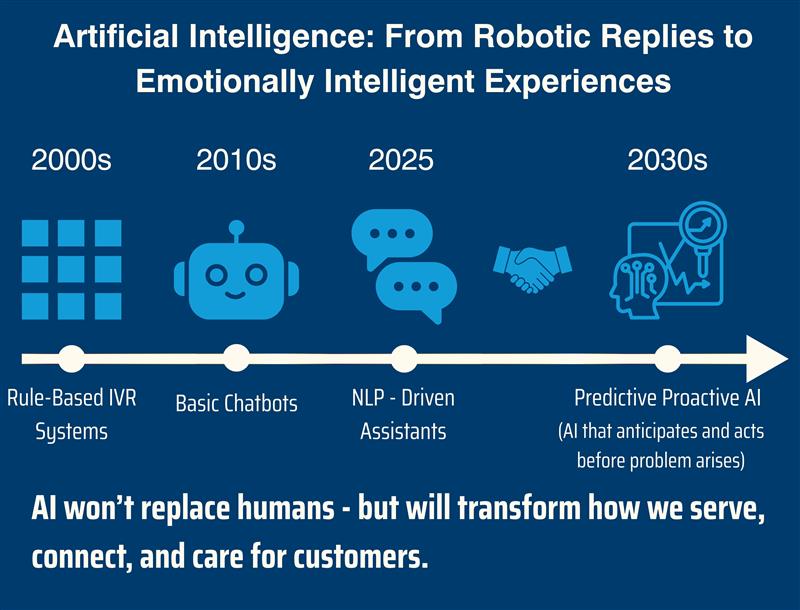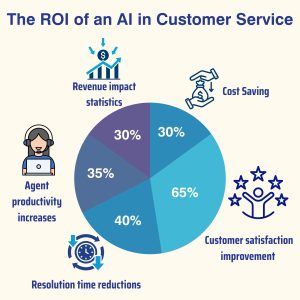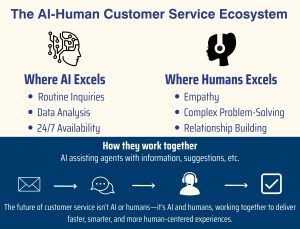Artificial Intelligence: A Benefit to Improve Customer Experience

In 2025, 68% of customers switched brands due to poor service—AI is helping to stop that. This staggering statistic reveals the critical connection between customer service quality and business survival in today’s competitive marketplace.
Artificial intelligence has evolved from simple “robot assistants” that frustrated customers with rigid responses to advanced customer experience enablers that understand context, emotion, and intent. Modern artificial intelligence customer experience solutions seamlessly integrate with human teams to create exceptional service experiences that drive loyalty and growth.

AI for better customer experience is transforming customer interactions and business outcomes by reducing response times, providing 24/7 availability, and delivering personalized solutions at scale. From intelligent routing systems to emotional intelligence capabilities, artificial intelligence in call centers is revolutionizing how businesses approach customer relationships.
Throughout this guide, you’ll discover practical applications of AI-powered customer support across customer service workflows, real-world success stories from industry leaders, and actionable strategies for implementing these technologies in your organization.
Picture this: A customer contacts support at midnight about a billing error preventing access to a critical service. Instead of waiting until business hours, an AI assistant instantly understands the problem, accesses account history, identifies the issue, and resolves it within minutes—turning potential frustration into satisfaction.
The Evolution of AI in Customer Experience
The journey of artificial intelligence in customer service began with basic chatbots that could only respond to specific keywords with predetermined answers. These early systems often left customers more frustrated than satisfied due to their limited capabilities and robotic interactions.
The current state of artificial intelligence in call centers in 2025 represents a sophisticated ecosystem where AI tools for call centers work alongside human agents to create seamless experiences. Modern systems handle complex queries, understand context from previous interactions, and predict customer needs before issues arise.
Key statistics show that 75% of customer inquiries can now be resolved by AI without human intervention, while 65% of organizations plan to expand their use of AI-powered customer support over the next 12 months. This widespread adoption demonstrates growing confidence in these technologies. Customer expectations have evolved to embrace AI-enabled customer experience as customers recognize the benefits of instant responses, consistent service quality, and 24/7 availability.
Why AI is Critical for Modern Customer Experience
Poor customer service costs businesses $856 billion annually in the United States alone, while globally, companies risk losing $3.7 trillion due to inadequate service experiences. These figures underscore why artificial intelligence customer experience has become a strategic necessity rather than a competitive advantage.
Statistics reveal that 59% of customers will abandon a brand after a single poor experience, while 86% of buyers willingly pay more for superior customer experiences. Customer retention and loyalty are directly tied to service quality, making AI investment a critical business imperative.
Changing consumer behavior and expectations in the digital age demands instant responses, 24/7 availability, and personalized service demonstrating understanding of individual needs and history. Traditional customer service models cannot scale to meet these expectations cost-effectively.

The competitive advantage of AI implementation includes measurable improvements in first-call resolution rates, reduced average handling times, increased customer lifetime value, and significant cost reductions. Companies effectively deploying AI for better customer experience report substantial improvements across all key performance indicators.
How AI Transforms Customer Service Operations
1. Intelligent Routing and Prioritization
AI-driven analysis of customer issues enables optimal routing based on complexity, customer value, and agent expertise. This intelligent system ensures simple questions receive immediate automated responses while complex issues reach qualified human agents without delay.
Prioritization based on customer value, urgency, and complexity ensures high-value customers and critical problems receive priority attention. Real-time adjustments based on call center volume and agent availability ensure optimal resource allocation throughout peak and off-peak periods.
2. 24/7 Availability Through AI Chatbots for Support
AI chatbot support now provides real-time, contextual responses that rival human interactions in many scenarios. These systems understand customer history, preferences, and context to deliver personalized solutions instantly.
Natural language processing in 2025 enables near-human conversations that interpret intent, emotion, and context rather than relying on keyword matching. Multi-channel support integration allows seamless experiences across web chat, mobile apps, social media, and voice channels.
Understanding when to use chatbots versus when human intervention is necessary is crucial for success. A retail implementation case study shows AI chatbots increasing customer satisfaction by 20% while handling 75% of routine inquiries automatically.
3. Personalization at Scale
AI-driven customer insights analyze vast amounts of historical data to create comprehensive customer profiles enabling personalized service at an unprecedented scale. These systems instantly access purchase history, previous interactions, preferences, and behavioral patterns.
Predictive service anticipates customer needs before issues arise, proactively reaching out with solutions or preventive measures. Examples include identifying patterns indicating potential product failures and automatically scheduling maintenance before problems occur.
4. Enhanced Self-Service Customer Support
AI-powered knowledge bases use intelligent search capabilities that understand customer intent rather than relying on exact keyword matches. These systems interpret questions phrased in natural language and provide relevant answers even when customers use different terminology.
Visual and voice-activated self-service options leverage AI to create intuitive interfaces guiding customers through complex processes step-by-step. AI eliminates the frustrations of traditional self-service by understanding natural language queries and providing contextual help.
Statistics show 69% of consumers prefer AI-powered self-service tools for quick issue resolution, indicating growing comfort with automated systems when they provide effective solutions.
The Human-AI Partnership in Customer Service
AI won’t replace human agents but will fundamentally transform their roles and capabilities. The future lies in augmentation, not replacement, where AI tools for call centers enhance human performance rather than eliminate jobs.

AI tools augment agent capabilities by providing real-time information, suggested responses, and predictive insights that help resolve issues more effectively. Skills agents need in AI-enhanced contact centers include technological fluency, emotional intelligence, complex problem-solving abilities, and relationship-building expertise.
Managing the transition to an AI-augmented workforce requires comprehensive change management, training programs, and clear communication about how AI enhances rather than threatens human capabilities. A compelling case study demonstrates a blended model where AI and human agents handle 10% more cases with improved satisfaction scores.
Implementing Emotional Intelligence in AI Customer Service
Beyond efficiency improvements, AI is developing emotional intelligence capabilities that detect customer sentiment, analyze tone, and adapt responses based on emotional context. Sentiment analysis and tone detection technologies monitor customer communications across all channels, providing insights into satisfaction levels.
Adapting responses based on customer emotions represents a significant advancement in how AI improves customer service. Systems automatically adjust communication styles, escalate to human agents when emotional support is needed, or provide additional resources when customers express frustration.
The balance between efficiency and empathy requires careful consideration of ethical considerations in emotionally intelligent AI, including privacy concerns and the importance of maintaining genuine human connection in sensitive situations.
Practical Implementation: Getting Started with AI for Customer Experience
Assessment of current customer service pain points should identify areas where AI can provide the most significant impact. This analysis must consider call volume patterns, common inquiry types, satisfaction scores, and agent workload distribution.
Choosing the right AI solutions requires matching specific business needs with appropriate technologies. Implementation roadmap and timeline considerations include pilot programs testing AI capabilities in controlled environments before full deployment.
Change management and staff training requirements are critical success factors often underestimated by organizations. Measuring success requires establishing clear KPIs for AI customer service initiatives, including efficiency gains, satisfaction improvements, and cost reductions.
Common pitfalls include over-relying on AI for complex emotional situations, insufficient training data, poor system integration, and inadequate change management. Avoiding these challenges requires careful planning and realistic expectations.
Future Trends: What’s Next for AI in Customer Experience
Emerging technologies in advanced natural language processing and predictive analytics enable even more sophisticated customer interactions. Integration of AI with IoT devices enables proactive service addressing issues before customers are aware of problems.
Voice-first AI experiences are becoming mainstream as natural language processing improves and voice interfaces become more sophisticated. AI-powered customer journey orchestration analyzes interactions across all touchpoints, providing comprehensive insights enabling personalized experiences throughout the entire customer lifecycle.
The rise of hybrid human-AI service models represents the future where AI and human capabilities are seamlessly integrated for optimal experiences. Preparing your business for the next evolution requires staying informed about technological developments and maintaining flexibility in implementation strategies.
The benefits of AI in customer service extend far beyond cost savings and efficiency improvements. Customer experience with AI creates opportunities for deeper relationships, proactive service delivery, and personalized interactions that build loyalty and drive growth.
The strategic importance of AI investment for competitive advantage cannot be overstated. Companies successfully implementing AI-enabled customer experience solutions position themselves to meet evolving expectations while optimizing efficiency and reducing costs.
Organizations should start small but think big with AI implementation, beginning with pilot programs demonstrating value before expanding to comprehensive systems. This approach allows learning and optimization while minimizing risks and maximizing return on investment.
Returning to our opening scenario: the customer’s midnight billing issue was resolved instantly because a company invested in AI for a better customer experience that understood needs, accessed relevant information, and provided personalized solutions.
The time to assess your customer service AI readiness is now. Companies waiting to implement AI-powered customer support risk falling behind competitors already delivering superior experiences through intelligent automation and human-AI partnerships.
Ready to transform your customer experience with AI? Etech Global Services specializes in implementing innovative AI solutions that enhance customer satisfaction while reducing operational costs. Our expert team can help you assess your current customer service capabilities, design a customized AI strategy, and seamlessly integrate intelligent automation into your existing workflows.


